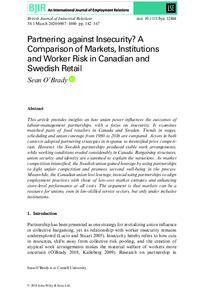Partnering against insecurity? A comparison of markets, institutions and worker risk in Canadian and Swedish retail

British Journal of Industrial Relations
2020
58
1
March
142-167
job insecurity ; labour market policy ; trade union role ; working conditions ; retail trade
Unemployment
https://doi.org/10.1111/bjir.12484
English
Bibliogr.
" This article provides insights on how union power influences the outcomes of labour‐management partnerships, with a focus on insecurity. It examines matched pairs of food retailers in Canada and Sweden. Trends in wages, scheduling and union coverage from 1980 to 2016 are compared. Actors in both contexts adopted partnering strategies in response to intensified price competition. However, the Swedish partnerships produced stable work arrangements, while working conditions eroded considerably in Canada. Bargaining structures, union security and identity are examined to explain the variations. As market competition intensified, the Swedish union gained leverage by using partnerships to fight unfair competition and promote sectoral well‐being in the process. Meanwhile, the Canadian union lost leverage, instead using partnerships to align employment practices with those of low‐cost market entrants and enhancing store‐level performance at all costs. The argument is that markets can be a resource for unions, even in low‐skilled service sectors, but only under inclusive institutions."
Digital
The ETUI is co-funded by the European Union. Views and opinions expressed are however those of the author(s) only and do not necessarily reflect those of the European Union or the ETUI.